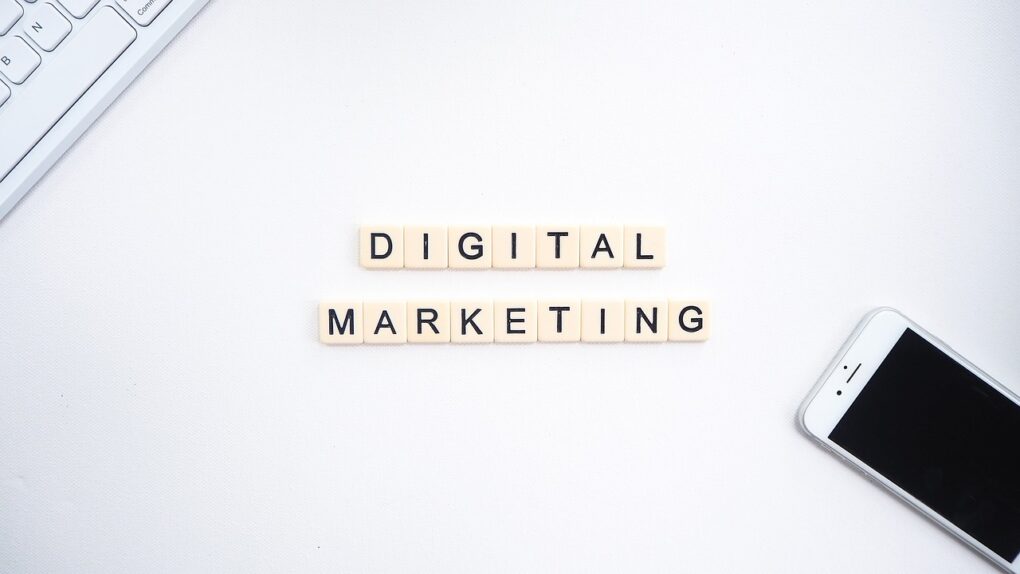Digital marketing is a rapidly changing career path, with new trends developing daily. So, if you’re attempting to start a career in digital marketing, it can feel like you’re aiming for a moving target.
The challenge that most aspiring marketers face today is studying digital marketing and balancing the latest innovations.
That is why we wrote this tutorial. We’ll teach you everything you need to know about studying digital marketing, what specializations are most in demand, and which educational path is best for you.
What is Digital Marketing?
Digital marketing is the process of promoting and selling items or services over the internet through one or more marketing channels such as search engines, social media platforms, and pay-per-click advertising.
It allows you to target audiences who are interested in your brand, communicate with them, and nurture them until they become clients.
The most essential types of digital marketing are search engine optimization (SEO), content marketing, pay-per-click (PPC) advertising, social media marketing, affiliate marketing, video marketing, website marketing, and email marketing.
How to Study Digital Marketing for Free

To become a great digital marketing consultant, you must learn how to work with all online marketing technology. In addition, you must gain the appropriate knowledge so that you may combine everything to produce the greatest potential result.
It’s a difficult job that demands a lot of patience and dedication, but the good news is that you don’t need to go to college or take a classroom course to become a digital marketing master.
You don’t even need to spend time searching Google for educational stuff. We conducted research and compiled a list of the greatest resources (nearly all free) that you may use to improve your skills from the comfort of your own home.
To learn digital marketing, you must become an expert in the following areas:
- Search Engine Marketing
- Content Marketing
- Inbound Marketing
- Social Media Marketing
- Email Marketing
- Affiliate Marketing
- Video Marketing
1. Search Engine Marketing
Search engine marketing is an important aspect of digital marketing. SEM refers to marketing on multiple search engines using Search Engine Optimization (SEO) or Paid Search Advertising.
-
Search engine optimization (SEO)
SEO is the practice of optimizing your website to appear higher in search engine organic results. SEO is vital in online marketing since it can provide highly focused traffic to your website. It is a longer process than Paid Ads, but it can yield greater benefits in the long run.
If you’re new to digital marketing, you should know that SEO isn’t a static discipline; it’s continuously changing. Google makes over 255 changes to its ranking algorithm each year.
This means that if you want to work in SEO, you must constantly analyze the industry and alter your digital marketing tactics to reflect changes. SEO is not difficult to learn, but it takes a systematic learning strategy. To simplify matters, the SEO process may be broken down into three major areas:
- Technical SEO: These are guidelines that apply to the technical aspects of SEO. It addresses crawling and indexing issues, page speed, the use of structured data, XML sitemaps, and other variables that are not related to a website’s content but rather to its entire infrastructure.
- On-Page SEO: This involves strategies for making your content more user-friendly and search engine crawlable. It has to do with using keywords in your content, page headings and style, providing appropriate ALT text for images, and other on-site elements.
- Off-Page SEO: These strategies might help you boost the trustworthiness of your website. The most frequent method is to obtain links from other websites to boost your domain authority and rank better in Google’s search results.
-
PPC Marketing
Search engine marketing also includes pay-per-click marketing, sometimes known as paid search advertising (PSA).
Pay-per-click advertising allows you to reach your target customers faster than SEO, but you must pay each time someone clicks on your ad.
Google Ads is now the largest PPC network, allowing you to display your advertisements in Google Search Results, Google properties (such as Google Discover, Gmail, and YouTube), and Google AdSense-enabled websites.
Learning PPC is not tough. You can complete the numerous online courses (shown below) and become a PPC-certified specialist in a matter of months.
Obtaining a certification alone does not qualify you as a good digital marketing specialist. Work with PPC campaign management to obtain practical experience.
2. Content Marketing
Every digital marketing effort relies on content. Whether it’s SEO, social media marketing, or email marketing, you’ll need content to reach and engage your target audience across many channels.
Content marketing is the process of finding, developing, and advertising the appropriate type of material to the intended audience.
To be a successful content marketer, you must have strong writing, SEO copywriting, and analytical skills.
You should learn:
- How to develop user personas and identify your target audience
- Different content types and how to use them.
- How to find keywords for your content marketing initiatives.
- How to develop information that meets the searcher’s goal.
- How to Create People-First Content
- How to Perform Content Audits
- How to use competitor analysis to identify opportunities.
- How to Promote Your Content
- How to Measure the Performance of Your Content Campaigns
Learning content marketing is a continuous activity that requires a great deal of practice. Creating content, whether written or video, is an art that can be mastered through experience and trial and error.
3. Inbound Marketing
As we indicated at the start of this guide, a good digital marketer should be able to combine several internet marketing tactics to achieve the best results.
That is precisely what inbound marketing is all about. The purpose of inbound marketing is to combine the actions of all other digital marketing efforts to create an exceptional user experience.
The main goal is to establish a well-defined process for acquiring new consumers, connecting with them, winning their trust, and earning their happiness.
Inbound marketing involves four steps:
- Attract: Using various means, like blog writing, social media ads, and influencer marketing, your goal is to capture users’ attention.
- Convert: Once you’ve received visits, the following stage is to get them to take the required action, i.e., convert.
- Engage: Use email marketing and other ways to engage with them and keep them aware of your company.
Delight them by providing amazing products and exceptional customer service, resulting in loyal customers and brand advocates.
Those who can accomplish this well are more likely to increase their consumer base faster than those who run isolated campaigns. Your role as a digital marketing manager is to guarantee that all digital marketing campaigns have the same aims and work toward the same objectives.
4. Social Media Marketing
Everyone believes that picturing a future without Facebook or Twitter is difficult today. Social media networks have taken over our lives and our approach to digital marketing.
Because the purpose of digital marketing is to connect with potential customers through their preferred channels, a new type of marketing emerged: social media marketing.
Social media marketing is exactly what the name implies: marketing on various social networks to locate and engage with clients.
Facebook is the most popular network, with more than 3 billion active monthly users, followed by Instagram, TikTok, and Twitter.
Learning how Facebook ads operate is a terrific way to get started with social media marketing. Facebook Ads Courses will cover all you need to know about Facebook Paid Campaigns.
Once you’re experienced in handling Facebook social media campaigns, you may expand your knowledge of Pinterest, LinkedIn, and Twitter marketing.
Aside from the paid advertising aspect of social media marketing, as an aspiring social media marketer, you must master the following skills:
- Create compelling content for social networks.
- Setting social media goals and developing strategies
- Conducting market research and analysis of your competitor’s social media campaigns
- Report on the results of your social media efforts.
- Learn to use social media listening and management tools.
- How to Find and Work with Influencers.
5. Email Marketing
Email marketing isn’t dead. Despite what you may believe, email is one of the most successful ways to convert visitors into customers and existing customers into repeat buyers.
To operate successful email marketing campaigns, you must first understand your audience. Otherwise, your emails will end up in your users’ spam folders.
You can think of email marketing as the final piece of the digital marketing puzzle. While all other marketing approaches focus on acquiring new clients, email marketing focuses on closing the sale.
6. Affiliate Marketing
Affiliate marketing is one of the oldest types of marketing, in which you earn a commission by selling other companies’ items. It’s a popular approach marketers use to make money online. It can be employed in two ways.
The first method is to promote other products on your website and social media platforms and earn a commission for each transaction. That is what the diagram above depicts in detail.
The second option is to launch your affiliate network and pay other creators commissions for promoting and selling your items or services.
To learn affiliate marketing, you must go through a series of processes. The most important are the following:
- Learn how affiliate marketing works.
- Join the affiliate marketing networks.
- Find products to promote.
- Learn what kind of content is effective for affiliate marketing.
- Learn how to write outstanding product reviews!
- Understand Google’s policies regarding affiliate links.
When you first start using affiliate marketing, you’ll quickly find that success is dependent on how well other marketing channels (SEO, content marketing, and social media marketing) perform. So studying digital marketing will help you succeed as an affiliate marketer.
7. Video Marketing
Although video content can be utilized in conjunction with content marketing and social media marketing initiatives, it is also a standalone digital marketing strategy.
The phrase “video marketing” refers to the process of employing video content to reach and engage with online users. The most widely used video sites are YouTube, TikTok, and Instagram.
What you need to know about video marketing is the following:
- How to use various technologies to produce video material.
- How to use paid advertisements to promote your videos.
- What types of videos does your target audience enjoy watching?
- How to use YouTube SEO to increase your videos’ organic visibility.
YouTube is the most popular medium for video material, and understanding organic and paid YouTube strategies will help you develop skills that can be used on other platforms. As a newbie, your primary goal should be to become an expert in YouTube marketing.
Conclusion
As a digital marketer, one of your responsibilities is to keep up with industry trends. You can accomplish this by following the news and stories published on key digital marketing websites.
This is a necessary time commitment for anyone serious about digital marketing because Google, Facebook, and Twitter are continually tweaking their algorithms and platforms to better serve their customers, which means that the sort of material that appears at the top of search results changes all the time.
Then it’s up to you to start exploring new digital marketing blogs and websites to help your campaign succeed, whether you choose SEO, content marketing, PPC, or another strategy.


